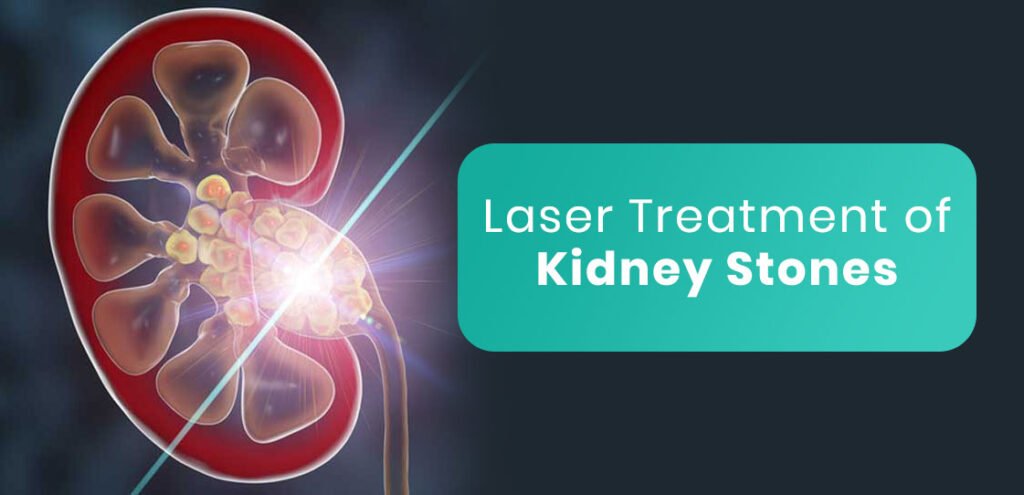Get Rid of Kidney Stones With Laser Treatment, Worldwide, more than half a million people go to emergency rooms because of kidney stone problems. Also, it is estimated that approximately one (1) in ten (10) people will have a kidney stone at some time in their lives.
Kidney stones (renal calculi or nephrolith) can make you suffer from severe pain on either side of your lower back, stomach ache, blood in the urine, fever, chills, vomiting, etc. Because of these, you may find it difficult to lead a happy and pain-free life. So, it is always advised to get diagnosed and treated by expert kidney specialists when you start noticing the symptoms of kidney stones.
Treatment for kidney stones depends on their size, shape, and location. Here are some treatment options through which your kidney stones can be passed out of the body or removed.
- Proper and healthy diet with low animal protein, salt, and sugar
- Lifestyle changes
- Medications like diuretics, painkillers, etc.
- Surgical procedures such as PCNL, RIRS, ESWL, URSL, etc.
Out of these, dietary and lifestyle changes with medications are recommended to treat and pass small kidney stones. For treating large kidney stones, surgical procedures with medications are suggested by most surgeons.
Also, among many surgical kidney stone treatment methods, laser procedures are highly recommended as they involve less chance of post-surgical complications and long-term side effects. In this post, let’s discuss how to get rid of kidney stones with laser treatment methods.
Laser Treatment for Kidney Stones
Percutaneous Nephrolithotomy (PCNL) and Retrograde intrarenal surgery (RIRS) are some of the best laser treatment methods recommended by many of the Nephrologists to treat kidney stones.
PCNL:
This kidney stone removal surgery is mostly recommended for those who are suffering from kidney stones that are larger than 14mm. Here are the steps of PCNL surgery.
- Before the surgery, an anesthesiologist will sedate the patient with general anesthesia. So, the patient will not feel pain throughout the surgery.
- Once the patient falls asleep, the surgeon will place a catheter in the bladder and remain in place with the use of an inflated balloon.
- One more catheter will also be placed into the ureter. Through this second catheter, the surgeon will instill the contrast dye. Contrast dye will help the surgeon for a better view and to find the exact location of kidney stones.
- Next, a thin needle will be used to access the collecting system of the kidney.
- Now, a guide wire will be used to allow the nephroscope to safely access the kidney.
- Once kidney stones are located, small ones will be removed using a grasper.
- Large kidney stones will be removed only after fragmentation with a laser.
- Then, the fragmented kidney stones will be excreted.
Once kidney stones are removed, the surgeon will perform a contrast study to make sure all sizes of kidney stones are completely retracted or not. Sometimes, a double J stent (DJ stent) may be placed to ensure that the ureter is well wide open to drain the urine.
RIRS:
RIRS is one of the highly recommended kidney stone removal surgeries. This surgical method is highly performed in patients whose kidney stones range between 8mm to 15mm or up to 2 cm. Here you can know how exactly RIRS surgery is performed.
- As this is a major surgery, an anesthesiologist will administer either general or spinal anesthesia to the patient.
- Once the patient falls asleep, the surgeon will insert a flexible endoscope into the natural urine passage. This endoscope will be placed into the bladder through the urethra from where it will be passed into the collecting part of the kidney.
- Once the scope reaches the desired location, it will be moved up to the urinary tract system (retrograde movement)
- Once the surgeon sees kidney stones, he/she will confirm the location.
- Then, a laser probe will be used to crush the kidney stones.
- For large kidney stones, the surgeon will use forceps to grab them.
- Then, the large stones will be fragmented using a laser.
- Fragmented or broken kidney stones will be collected in the basket and removed.
Apart from laser-assisted kidney stone treatment methods, most doctors recommend other surgical procedures like Ureteroscopic removal of stones or ureteroscopic lithotripsy (URSL) and Extracorporeal shock wave lithotripsy (ESWL). Therefore, before selecting the best suited and safest kidney stone treatment, consult the expert doctor and know everything about each surgical procedure.
Here are some of the benefits of laser kidney stone treatment methods.
- No major risk are associated
- No damage to the surrounding healthy tissues
- Involves no severe pain
- Less or minimal bleeding during the surgery
- Involves no post-surgical complications
- Less time to complete the surgery
- Removes both small and large kidney stones
- Treats urine obstruction due to kidney stones
- Improves renal function
- Eradicates ureter obstruction because of kidney stones
For better understanding of kidney stone treatment methods, have a look at the below table.
Comparison of PCNL, RIRS, ESWL, URSL
| Parameters | PCNL | RIRS | URSL | ESWL |
| Recommended for | > 14mm Kidney stones | 8mm to 15mm or up to 2 cm kidney stones | Kidney stones closest to the bladder, in the lower half of the ureter. | Kidney stones whose diameter is between 4 mm (0.16 in.) and 2 cm (0.8 in.) |
| Success rate | 805 to 94% | 75% to 90% | 85% to 95% | 70% to 89% |
| Time to complete | Approximately 1.5 hours to 2 hours | Approximately 1 hour to 2 hours | Approximately 45 minutes to 90 minutes | Approximately 45 minutes to 60 minutes |
| Cost | 95,000 – 1,05,000 (approx.) | 60,000 – 80,000 (approx.) | 60,000 – 80,000 (approx.) | 35,000 – 50,000 (approx.) |
| Anesthesia | Administered | Administered | Administered | Administered |
| Painful or not | No pain | No pain | No pain | No pain |
| Risk of infection | Minimal | Minimal | Minimal | Very minimal |
| Recurrence of kidney stones | No | No | No | No |
| Post-surgical complications | Very rare | Very rare | Rare | Very rare |
(Note: The info mentioned in this table is gathered from multiple online and offline trusted sources and is subject to change from one patient to another due to various factors. So, use this for reference purposes only. )
What to do before getting rid of kidney stones with laser treatment methods?
Before getting rid of kidney stones, one should know a few things and follow some precautions. Some of those are mentioned below, which can help an individual prepare for kidney stone treatment.
- Know everything about kidney stone surgery like its benefits, side effects, long term effects, complications, post-surgical risks, advantages and disadvantages, etc.
- If you are allergic to anesthesia, inform your doctor as it can alter the outcomes of the surgery.
- Wear loose-fitting and comfortable clothes, so that it is easy for you to change the clothes to a hospital gown.
- In case you are on medications like blood thinners, talk with the doctor and follow as he/she says.
- Avoid eating and drinking from the night before the day of the surgery (as directed by the surgeon).
- Don’t smoke the day before the surgery as it can increase the risk of surgical complications.
- Before coming to the hospital, leave all your valuables like jewelry at home.
- Once you are prepared for the surgery, you or your family member or your guardian needs to sign the consent form.
Care after undergoing laser kidney stone treatment:
The surgeon will suggest some post-surgical care tips to help the individual recover and heal quickly after the surgery. In this post, we have mentioned some of those tips and are:
- Drink plenty of fluids (2.5-3.5 liters/day) to prevent the recurrence of kidney stones.
- Take painkillers as directed by the surgeon to get relieved from the post-surgical pain. Also, don’t overuse the painkillers.
- Take the prescribed medications as suggested by the doctor
- Avoid or restrict eating foods that are high in protein.
- Consume a diet that is low in salt and animal protein like beef, chicken, pork, eggs, etc.
- Restrict yourself from eating sodium and oxalate foods.
- Reduce the intake of calcium supplements.
- Try to avoid sodas especially those with high amounts of fructose and sweetened iced tea.
- Avoid intake of high doses of vitamin-c supplements.
- Attend all the follow-up sessions without missing any.
In case you or your family members are suffering from kidney stones, consult the best and experienced nephrologists (kidney stone specialists). Depending on the stones’ size, shape, and location, the doctor can recommend either PCNL, RIRS, URSL, ESWL, or lifestyle changes with medications.
At Pristyn Care, we house several expert kidney stone specialists who can diagnose the severity of the condition with the help of advanced diagnostic tests. Also, our doctors are experts in treating kidney stones with the safest surgical procedures at an affordable cost. If you wish to consult our doctors, you can call us. At our partnered top hospitals in India, our kidney doctors use laser-assisted procedures like PCNL and RIRS to get rid of kidney stones with no side effects and risks.







Leave a Comment
You must be logged in to post a comment.